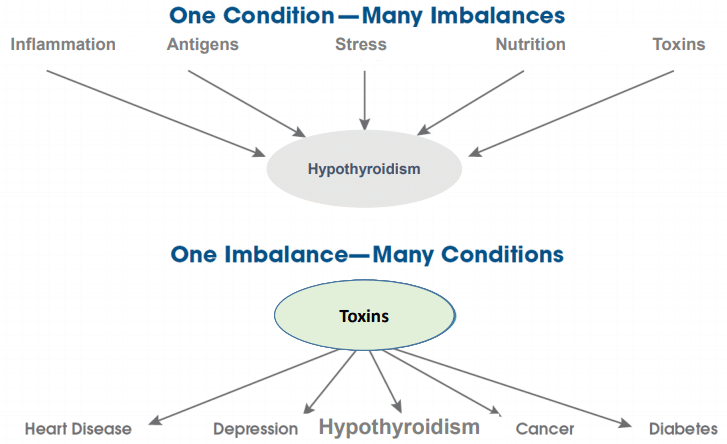The Functional Causes and Solutions to an Underactive Thyroid
Everything in your body is connected. One of the key ways your body does this is through hormones. Hormones act as messages to elicit a physiological response from cells in response to environmental demands, hence imbalanced hormones often reflect an imbalanced life. The thyroid gland is one of the most important. It plays a major role in metabolism, growth and development, which is why problems that occur here can cause devastating effects on how we feel, function and our energy!
Thyroid disorders are also very common with it being estimated that 1 in 20 of us now suffer from temporary or permanent thyroid problems in the UK. Hypothyroidism is the most prevalent, however, up to 60% of people with the condition are actually unaware that they have it. How many friends or family members do you know who are fatigued, struggle to manage their weight, suffer from constipation and experience depression or brain fog?
This article discusses the causes of hypothyroidism, standard treatments and their limits, and how a Functional Medicine approach could benefit you.

Standard Treatment for Hypothyroidism in the UK
The current standard of care for hypothyroidism is hormone replacement therapy using Levothyroxine, a drug which patients rarely get off once prescribed. In practice, we see a huge amount of people taking this. In fact, Levothyroxine was the second highest prescribed drug in the UK in 2018 with 32.2 million prescriptions dispensed in England alone. That is over 10 million more than what it was in 2010. These numbers may be reflected in a recently published systematic review in the BMJ which strongly suggested that thyroid hormone medication was being overprescribed. This was mainly for subclinical cases which can be a risk factor in developing into full-blown hypothyroidism and is associated with a risk of cardiovascular disease.
However, an association does not mean causation. The same study also determined that hormone replacement therapy was ineffective for reducing symptoms such as depression, fatigue and increased weight in subclinical cases. Does this suggest that hormone replacement drugs are ineffective? Or does this suggest that the underlying causes of feeling tired, weight gain and cardiovascular disease are more complex and multifactorial than simply a lack of thyroid hormone? Many people with hypothyroidism do require medication, however, the standard conventional approach does not go further and question why this occurred in the first place. Is this important?
The Causes of Hypothyroidism and a Functional Medicine Approach
The main causes of hypothyroidism include autoimmune conditions such as Hashimoto’s, surgical removal of the thyroid, side effects from radiation and other medications, an over response to hyperthyroid treatment, congenital causes and nutritional deficiencies. Surgery and side effects of other medication are a different matter. However, autoimmune conditions are considered to be responsible for 90% of all hypothyroidism. In the current conventional system, a patient is diagnosed with hypothyroidism and prescribed hormone replacement medication to counteract the symptom of a lack of thyroid hormone, regardless of the cause. Is it likely that that patient will go on to develop other health conditions because the underlying cause has not been addressed? If you consider hypothyroid patients have a higher prevalence of obesity, diabetes, osteoarthrosis, asthma, hypertension and dyslipidemia, it would appear that decreased thyroid function is a symptom among a collection of other related symptoms with an underlying and unifying connection. The role of Functional Medicine is to investigate and address that connection, while the medication manages the symptom.

Autoimmune disease, as with most chronic illness, is a complex condition. There are many possible factors which can contribute to it, current pharmaceutical solutions are relatively ineffective and it often requires detailed analysis and close management from an appropriately trained practitioner. If you do suffer from hypothyroidism caused by autoimmunity, please contact us to dinf out if we can help you. However, while addressing the root cause of autoimmunity may be complicated, there are many things you can do to help your thyroid function better. Will a patient with a healthier lifestyle which supports thyroid function in the presence of autoimmunity feel better, have more energy and fewer symptoms than a patient who has a poor lifestyle which detriments thyroid function in addition to autoimmunity? There is a large amount of research that supports that it does.
Food and Your Thyroid
Food Which Promotes Healthy Thyroid Function
Nutrients required for thyroid hormone production and insufficiencies in which are associated with thyroid dysfunction:
- Vitamin D – found in fish, eggs, mushrooms and through SUNLIGHT. One study found a 72% increase in vitamin D deficiency in autoimmune thyroid disease compared to healthy individuals.
- Iron – found in spinach, red meat, shellfish, organ meat, legume, broccoli and pumpkin seeds. Required for optimal function of thyroid enzymes which convert T4 to the more active T3 form and can also improve the effectiveness of iodine supplementation.
- Iodine – found majorly in seafood. One study found that 25% of vegetarians and 80% of vegans were iodine deficient. However, Iodine excess has also been associated with hypothyroidism.
- Selenium – found in brazil nuts*, fish, turkey, beef, eggs and sunflower seeds. Increases the conversion of T4 to the more active T3 form, improves the effectiveness of iodine supplementation and has an important role in anti-oxidation. Multiple studies have now demonstrated a reduction in antibodies involved in thyroid autoimmune disease with selenium supplementation, especially when used alongside thyroid medication.
- Zinc – found in meat, shellfish, nuts and seeds, legumes, eggs, whole grains and dark chocolate. Increases the conversion of T4 to the more active T3 and improves cellular sensitivity to thyroid hormone.
- Vitamin A – Found in vegetables such as sweet potato, broccoli, carrots, peppers and spinach. Increases the uptake of iodine and is required to produce thyroid protein.
- Vitamin B2, B3, B6 – Found in meat, fish, eggs, dark leafy green vegetables and sunflower seeds.
- Tyrosine – found in high protein foods, nuts/seeds, cheese, eggs and beans. Required to produce thyroid hormone.
*The requirement of nutrients for optimal health is always a balance. Too much of one thing can cause a problem. This is especially true of iodine and selenium in relation to thyroid health as toxicity in these nutrients have been well documented. Therefore, you should stick to recommended daily allowances unless you have otherwise been advised by a health practitioner. A single brazil nut, for example, contains 68-91 micrograms of selenium, meaning that just one can provide the daily allowance of 55 micrograms. Consume these foods in moderation and monitor yourself for symptoms of selenium toxicity. For the vast majority of us, however, we are not even reaching daily requirements for key nutrients such as these so increasing foods which contain them are likely to have beneficial effects even at a normal consumption level.
Food to Avoid in Hypothyroidism
We can develop problems with food when we are deficient in nutrients and when we are too toxic in certain nutrients, as discussed above with selenium and iodine. Apart from these nutrients here are a few more things to know about food and your thyroid:
- Calorie restriction – diets which are insufficient in calories for the individuals’ needs have also been shown to decrease levels of the most active form of thyroid hormone (T3). Fasting has become an extremely popular and effective way to improve your health, however, there are correct and incorrect ways of doing it for sustainable and true health effects. Long term calorie restriction signals to your body that it needs to decrease metabolic rates and conserve energy for a period of famine which would explain the reduction in thyroid hormone. This is a key reason why many fasting regimes advocate a cyclical approach. In the case of sub-optimal thyroid function, this research suggests that focussing on the timing of when you eat, such as an early dinner and late breakfast, compared to the amount you eat may be a more important factor to acquire the benefits intermittent fasting.
- Carbs and sugar – there is a wide debate about a low carb diet and it’s effects on thyroid hormone. It has been postulated that insulin plays a role in the conversion of T4 to T3 and studies have demonstrated a reduction in T3 in low carb diets. Conversely, it is also well documented that high insulin levels and insulin resistance are very closely associated with hypothyroidism. This suggests that your thyroid health depends on what type of carb you are consuming and what is natural for your body. Consuming an extremely limited amount of carbohydrate or too much of the wrong type of carbohydrate can activate the release of cortisol in the stress response which has been shown to decrease stimulation of the thyroid and the release of thyroid hormone. Simple and refined carbohydrates such as sugar and white bread significantly increase blood glucose and cortisol levels and contribute to metabolic disease which has a high association with hypothyroidism. Complex carbohydrates such as whole and natural vegetables have quite the opposite effect on your health, especially the leafy green kind. These should be the main bulk of your plate unless you have been instructed otherwise by a healthcare professional as a short term dietary intervention.
- Goitrogens – this is another source of debate without clear evidence, however, it is worth being aware of if you suffer from hypothyroidism. Goitrogens are substances in food such as soy, broccoli, cauliflower, sweet potatoes and dark leafy greens which have been proposed to affect thyroid function by blocking the uptake of iodine. This has been demonstrated in animals studies and in vitro, however, most human studies have not supported this conclusively. Although the research is not clear on this topic, it may be reasonable to take caution and avoid eating these foods raw as Dr Chriss Kresser recommends in this interview on the subject.
- Food Sensitivities – we are all individual and react to food in different ways. Food sensitivities, such as gluten and dairy, can cause inflammatory responses which have been shown to decrease levels of thyroid hormone. Consistently consuming food that you may be sensitive to can, therefore, result in a consistent inflammatory process and an upregulated immune system which are characteristics of autoimmunity. Autoimmune thyroid disease and diabetes type 1 are also the most commonly associated conditions with celiac disease. Patients with celiac disease have in fact been demonstrated to have a three-fold increased risk of developing thyroid disease. Unfortunately, you do not need to be celiac to suffer from the effects of gluten. Studies have demonstrated that people with non-celiac gluten sensitivity have similar rates of autoimmune disease as people suffering from celiac disease. However, in this same study which found a three-fold increased risk, 71% of patients without an autoimmune condition were able to normalise their markers of subclinical hypothyroidism by following a gluten free diet. Food allergy testing and an elimination diet can be effective ways of identifying these sensitivities and their potential role in thyroid autoimmune disease.

Other Factors Which Affect Your Thyroid
Toxins Which Affect Your Thyroid
As many as 150 industrial chemicals have been shown to result in the reduction of TSH and/or T4. Some of the commonly known offenders include:
- Fluoride – there is a large body of research which questions the use of fluoride in water. In a study of 7095 medical practices in England a significantly higher prevalence of hypothyroidism was found in areas with high fluoride levels in drinking water. This is also reflected in a systematic review and meta-analysis containing multiple studies from China. Suggested mechanisms include the inhibition of iodine absorption. Fluoride is also used as a pesticide to kill microbes, which makes this research more plausible when considering that increased ingestion of a microbe killing substance has the potential to disturb to our gut flora. An imbalanced microbiome can be the source of many health conditions such as autoimmunity through its regulation of inflammation and the immune system. You may wish to consider fluoride free products and filtering water using a system which reduces the fluoride content in drinking water.
- Pesticides such as DDT, and Dioxin, may also activate liver enzymes which break down thyroid hormones at a quicker rate and decrease the time they are active for.
- PCB’s and BPA – have been suggested to have direct effects on thyroid hormone receptors. PCB’s have now been banned due to their known toxic qualities, however, they do not break down easily in the environment. BPA, however, is still used extensively in plastic bottles and containers, and in the coating of food tins.
- Heavy metals such as mercury and lead. Avoid known sources such as long living fish like tuna and swordfish which have been well documented to accumulate high levels of mercury.
Although it is important to understand which chemicals are main offenders, it is more effective to focus on reducing your overall toxic load, rather than hunting down each individual toxin in your body. We are all exposed to toxins in our life, and our bodies are designed to deal with them so that they do not usually cause us harm. However, it is true our toxin exposures are dramatically increasing, which is why it is even more important to avoid known sources of toxins while supporting your body’s natural detoxification and elimination pathways. This can include eating organic produce, avoiding chemical based beauty and cleaning products, liver support, ensuring healthy bowel movement and maintaining mitochondrial function. Constipation, for example, can be an important problem because it prevents us from eliminating waste toxins and increases our toxic load. Please contact us for further information if you require help with these problems.
Movement Can Be Beneficial and Detrimental to Thyroid Health
Movement is essential for thyroid health. It increases the production of thyroid hormone and increases cellular sensitivity to thyroid hormone. However, similarly to carbohydrates, this benefit is determined by understanding what is natural for your body. An excessive amount of intense exercise and without sufficient recovery is unnatural and stress for the body which activates the release of cortisol and a resultant decrease in thyroid function. It is not uncommon now for people participating in activities which incorporate consistently strenuous exercise to develop problems with metabolism and weight control.
Sleep and Thyroid Function
It may come as no surprise that if certain foods and exercise can cause stress and cortisol to detrimentally affect your thyroid, then a lack of sleep will do the same.
Mental Stress and Your Thyroid
Mental stress arguably has the greatest effect on your cortisol levels which is why in some cases improving the way you respond to stressful situations can contribute the most to your health and reverse chronic conditions. In 2018, the largest known study of stress in the UK revealed that 74% of the 4619 participants reported that they had been so stressed they felt they were overwhelmed and unable to cope at points that year.
The Side Effects of Drugs and Thyroid Function
As discussed at the beginning of this post, one of the known causes of hypothyroidism is the side effects of other medication. This includes:
- Beta Blockers
- Birth control pills
- Estrogen replacement
- Proton Pump Inhibitors such as omeprazole and aspirin
- Lithium
- Phenytoin
- Theophylline
- Chemotherapy
The main action the drugs have on thyroid function is by blocking the conversion of T4 to T3. While some of these medications are necessary for patients, some can be avoided. For those people taking these medications, it is important to be aware of the side effects so that they may counteract them through additional thyroid support using methods as detailed above. It is important, however, along with all recommendations posted here, to seek guidance from a trained practitioner and the advice of your doctor.

Living with the symptoms and fatigue caused by hypothyroidism can be extremely difficult. Hopefully, this article has demonstrated the many ways that have been proven to improve your thyroid function and given you more control over your health. Although making lifestyle changes are generally safe, you may wish to seek guidance from a functional medicine practitioner who can help you to identify the causes, and formulate solutions, to sub optimal thyroid function.
Please feel free to contact us should you have any questions, or share this with someone you know and think it may be helpful for them.
Yours in health,
Dr Jamie Ellis, DC and Dr Judith Johanne Torstvedt, DC







Very good and informative article!! Thank you for All the work you put into helping others, Dr. Jamie and Dr.Judith!
Thank you Kia – glad you found it helpful!